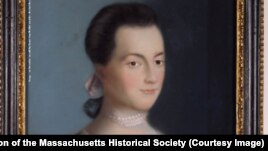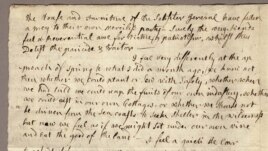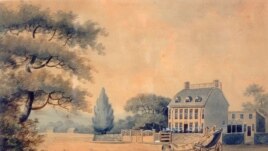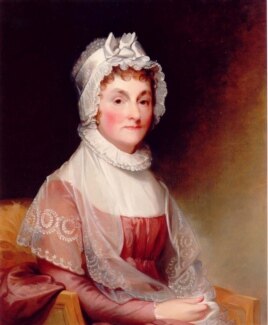09 January, 2016
Abigail Adams was like a modern woman, even though she lived in colonial times.
She strongly supported the American Revolution, women's rights and education. She worked to get public schooling for girls. She was a smart businessperson during a time when women in the U.S. could not even own property.
Abigail Adams and her husband, John Adams, were also strong voices against slavery at a time when owning another person was legal in the U.S. Unlike some of America's other founders — including George Washington and Thomas Jefferson — John and Abigail Adams did not own any slaves.

Abigail Adams, portrait by Benjamin Blyth, circa 1766. The portrait was painted around the time she married John Adams.
Journalist and author Cokie Roberts has written several books about women in the early days of the U.S., including "Ladies of Liberty." She says Abigail Adams is best known for this phrase: "Remember the ladies."

Abigail Adams' letter to her husband, John Adams, in which she tells him to 'remember the ladies.'
"When the men were meeting in Philadelphia to think about creating a new country, breaking away from the British, she wrote to her husband and said, ‘Well I suppose we will have to have to have a new code of laws and when you write those laws, remember the ladies, because all men would be tyrants if they could.' And those have become some of the most famous words in the English language, or the American English language. ‘Remember the ladies.'"
Roberts adds that nobody knows exactly what Abigail was arguing for at the time. She thinks Abigail, who was a strong supporter of women's rights, was probably arguing in favor of legal rights for women.
A life in letters
Abigail Smith was born in Weymouth, Massachusetts in 1744. Her father was a pastor and she received a fine education at home -– but not a formal one at a school.
She married John Adams when she was 20 years old. John became a prominent lawyer in Boston.
Historians know a lot about Abigail and John Adams because they wrote each other many letters over the course of their marriage. And, unlike Martha and George Washington, the Adams did not burn their letters. More than 1,100 still survive.
Abigail and John often wrote to each other when they were apart.

The Adams' family home, Peace field, in Braintree, Massachusetts. 1798 Painting by E. Malcom.
First, during the American War of Independence against the British, John left the family farm in Massachusetts and stayed in the city of Philadelphia, Pennsylvania. He was an important part of the Continental Congress there.
Journalist Cokie Roberts says Abigail managed the family's affairs while her husband was gone.
"She was very good at math. We know that because even though women, married women, were not allowed to own property at that time, she bought and sold property all the time. And she made a very handy income which supported the family for long periods of time, when her husband was away and not making any money."
Abigail and John were apart again when he went to Europe as one of the first U.S. diplomatic ministers.
When John was in Europe, Abigail would see what people needed in America. She asked John to send items such as lace, cloth and handkerchiefs from Europe, then she would sell them at home to make money.
The separations were difficult for the couple. Cokie Roberts says, "John Adams really could not function without her."
One example: When John was sworn in as president of the United States in 1796, Abigail was still at their home in Massachusetts. She was taking care of the family's farm, as well as John Adam's mother, who was dying.
But John wanted Abigail at his side.
"He wrote her letters every day saying, 'You must come, you must come. I cannot do this without you! Come, I can't do this! You must come!' The letters became more and more and more insistent. Because he really depended on her so mightily to help him make decisions about what was important and what political decisions he should make."
Eventually, Abigail was able to join her husband. They became the first people to live in the president's mansion in Washington, D.C. – what we call today, the White House.
The house was still being built when they moved in. Abigail wrote that it was cold and drafty. She hung up the laundry to dry in the East Room. Today, the East Room is where formal dinners and important events are held.
Abigail Adams said her situation as first lady was one of "splendid misery."
John lost the presidential election of 1800 to Thomas Jefferson. Then Abigail and John retired to their land in Massachusetts. She was 73 years old when she died in 1818.
Legacy
Three of her daughters and one of her sons died before she did. Two other sons survived her, including John Quincy Adams. He became the sixth president of the United States. However, Abigail did not live to see him elected president.
Until recently, she was the only woman to be both the wife and mother of a U.S. president. When George W. Bush was elected president in 2000, his mother, Barbara Bush, became only the second woman to have both a husband and a son be president.
Reaching back all those years to the 1700s, what many people say stands out the most about Abigail Adams is her relationship with her husband.
Journalist Cokie Roberts says they were a team.
"The relationship with John was one that was very, very close, and quite romantic."
Sometimes Abigail Adams was an outspoken adviser to her husband. Roberts says she had "an abrasive style" and there were times when "she could not hold her tongue." People complained about her, especially those from the opposing political party. Some called her "Presidentess." The term was not a compliment.
If one is to believe White House lore, Abigail Adams still appears at the White House ... as a ghost. The White House Historical Association says, "Abigail Adams hung laundry in the East Room, and contemporary staff can smell wet laundry and the scent of lavender."

Abigail Adams, Portrait by Jane Stewart 1800-1812
Like Martha Washington before her, Abigail Adams set an example of what a political wife and a first lady could be. She was more outspoken than Martha, as well as more modern in her thinking and style. But both were treasured partners for their husbands, the first, and second, presidents of the United States of America.
I'm Anne Ball.
What do you think are important qualities in the spouse or partner of a politician? Write to us in the Comments section and on 51VOA.COM.
Anne Ball wrote this story. Kelly J. Kelly was the editor.
_____________________________________________________________
Words in This Story
insistent – adj. demanding that something happen or someone do something
mightily –adv. very much
prominent –adj. well known and important
endured – v. to experience something painful for a long time
lace – n. a very light and thin cloth made with patterns of holes
handkerchief – n. a small cloth used for wiping your ears, nose, or face
drafty – adj. cold air moving through that makes it feel cold
outspoken –adj. talking freely about what one thinks
abrasive – adj. having a rough, unpleasant quality
she could not hold her tongue – phrase. She was not able, or unable, to control what she said, and said things other's disagreed with.